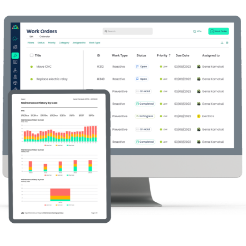
The Importance of CMMS Experience for Maintenance Managers: Five Compelling Reasons to Consider
Introduction
Computerized Maintenance Management Systems (CMMS) have become essential tools for maintenance managers due to an ever-evolving and challenging operations-focused environment.
The role of a CMMS maintenance manager is critical in ensuring the smooth operation of equipment and assets and compliance with regulations. Unlike other positions where on-the-job training suffices, having experience with CMMS is essential. For example, hiring an experienced CMMS manager has numerous benefits, including a background in improving operational efficiency and accessing real-time data for informed decision-making, instituting effective preventive maintenance strategies, and ensuring regulatory compliance.
Here, we will delve into the importance of CMMS experience for maintenance managers by providing five compelling reasons to consider when organizations seek to fill this position.
Reasons to Hire a Maintenance Manager with CMMS Experience
1. Understanding the role of CMMS in maintenance management
Understanding the pivotal role CMMS plays in effective maintenance management is crucial for maintenance managers. CMMS empowers them to centralize maintenance information, streamline work order processes, and gain insights through its analytics capabilities. This enhanced efficiency, reduced downtime, and improved asset performance give them a sense of control and capability.
A maintenance manager skilled in CMMS implementation can ensure the software's optimal functionality and leverage its capabilities to streamline maintenance operations, minimize downtime, and maximize asset performance. An experienced maintenance manager understands that by harnessing CMMS data and analytics, proactively identify maintenance trends, allocate resources efficiently, and make data-driven decisions to enhance overall operational efficiency. A maintenance manager’s comprehensive knowledge of CMMS functionalities means they can implement strategic maintenance plans, prioritize tasks effectively, and ultimately drive business success.
The role of maintenance managers skilled in CMMS also extends to implementing predictive maintenance and real-time monitoring of equipment health. Among other things, they have experience integrating Internet of Things (IoT) sensors with CMMS organizations, can continuously monitor equipment performance and predict potential failures before they occur. This predictive approach allows for timely interventions, reducing unplanned downtime and extending the lifespan of critical assets.
Additionally, a maintenance manager with CMMS experience knows how the system can enhance collaboration and communication among team members. Its centralized platform that tracks work orders, schedules tasks, and documents maintenance activities ensures that all team members know their responsibilities and progress, reducing the risk of miscommunication and missed maintenance tasks.
2. Improved efficiency through streamlined processes

(alt text - image showing improving efficiency through streamlined processes)
A maintenance manager with CMMS experience enables them to streamline the system’s processes effectively. By leveraging the software's functionalities, managers can automate maintenance schedules, manage work orders efficiently, and track asset performance seamlessly. This optimized approach helps reduce manual tasks, eliminate paperwork, and standardize organizational maintenance practices. With CMMS experience, managers can create workflows that ensure timely maintenance interventions and enhance operational efficiency.
The automation capabilities of CMMS rely heavily on a skilled maintenance manager who is well-versed in creating preventive maintenance schedules. This vital feature ensures routine inspections and servicing are done without delay. For example, CMMS can automatically generate and assign work orders based on predefined maintenance intervals or condition-based triggers, minimizing equipment failure risk and extending asset longevity. A maintenance manager’s ability to do this seamlessly results from CMMS experience.
3. Enhanced asset tracking and management
![]()
Enhanced asset tracking and management are crucial to a successful maintenance strategy, so CMMS experience is essential. Maintenance managers skilled in CMMS know how to efficiently track and manage all assets within the organization effectively. By utilizing the CMMS software features, managers can monitor asset performance, track maintenance history, and schedule preventive maintenance tasks. This level of asset visibility ensures optimal performance, reduces downtime, and extends the lifespan of critical equipment. Additionally, detailed asset tracking allows for quick identification and resolution of issues before they escalate into costly problems.
Furthermore, CMMS experience facilitates maintenance managers in making data-driven decisions regarding asset maintenance and replacement, ultimately leading to cost savings and improved operational efficiency. The software's analytics and reporting tools provide insights into asset utilization, helping managers identify underperforming or overused equipment and optimize resource allocation. The ability to forecast maintenance needs and plan accordingly minimizes unexpected failures and disruptions. Knowledge and experience with CMMS allow the system to achieve its full potential.
4. Real-time data for proactive maintenance
One of the most compelling reasons CMMS experience is essential for maintenance managers is the ability to access real-time data for proactive maintenance. With up-to-date information on asset performance and maintenance needs, managers can anticipate issues before they escalate into disruptive and costly delays. This immediate access to data provides security, allowing for timely interventions and ensuring minor problems are addressed before they become major failures.
By leveraging real-time data, maintenance teams can prioritize tasks efficiently, optimize resources, and ensure equipment reliability. They can allocate workforce and materials where they are most needed, avoiding unnecessary expenditures and delays. The ability to monitor trends and identify patterns in equipment behavior also aids in refining maintenance schedules and strategies, providing a sense of peace of mind and reducing stress.
This proactive approach not only increases operational efficiency but also enhances overall productivity. Organizations can achieve higher output and better quality control by minimizing disruptions and maintaining a smooth workflow. Additionally, continuous monitoring facilitated by real-time data helps maintain compliance with safety and regulatory standards, reducing risks and ensuring a safer working environment.
The return on hiring a seasoned maintenance manager with CMMS experience is worth the time and effort required. The potential cost savings from reduced downtime, optimized resource allocation, and extended asset lifespan can significantly outweigh the initial investment.

5. Compliance and reporting advantages
CMMS experience allows maintenance managers to track and manage regulatory compliance requirements efficiently. By utilizing the system's reporting capabilities, managers can generate custom reports and documentation, ensuring that all maintenance activities align with industry regulations.
Additionally, CMMS systems can integrate with other business software, enabling seamless data sharing and analysis across departments. This integration facilitates a holistic approach to compliance management, where maintenance activities are coordinated with other operational processes, enhancing overall organizational efficiency. By maintaining a comprehensive and accurate record of compliance activities, organizations can protect themselves against potential legal and financial repercussions, thereby securing their reputation and operational stability.
With CMMS experience, maintenance managers can streamline reporting processes, saving time and ensuring accuracy in record-keeping. Automated report generation reduces the risk of human error and ensures that all necessary documentation is consistently up-to-date. The ability to set reminders and alerts for compliance-related tasks ensures no critical deadlines are missed, further enhancing the organization's adherence to regulatory requirements. A manager with these skills shows an organization's commitment to regulatory standards.
Conclusion
The importance of CMMS experience for maintenance managers cannot be overstated. Skilled managers know CMMS’s features and nuances, which enable them to enhance maintenance operations and streamline regulatory compliance efforts. Their knowledge and experience reveal themselves in the custom reports generated, the activities accurately tracked, and the due diligence displayed. CMMS experience empowers managers to make informed decisions based on real-time data, optimize resource allocation, and improve asset reliability, contributing to smoother and more efficient operations. This collective skillset is vital in today's competitive business environment.
Investing in maintenance managers with CMMS experience is an investment in long-term success for organizations. By mastering CMMS tools, managers can foster a proactive maintenance culture, minimize downtime, and extend the lifespan of critical equipment. Proficiency in using CMMS tools leads to significant cost savings and enhances the organization's overall productivity and safety. Moreover, efficiently managing compliance requirements and providing transparent documentation strengthens the organization's credibility and reduces the risk of regulatory penalties.
Ultimately, CMMS experience equips maintenance managers with the knowledge and capabilities to adapt to evolving industry standards and technological advancements. This adaptability ensures that maintenance practices remain cutting-edge and aligned with best practices, securing the organization's competitive edge in the market.
TABLE OF CONTENTS
Keep Reading
Ever find yourself checking into a luxury hotel and expecting a relaxing stay, only to find a ...
11 Apr 2025
Organizations are witnessing swift changes in the business environment and confronting a ...
8 Apr 2025
Last month, news outlets and the entire internet was abuzz with the return of NASA astronauts ...
3 Apr 2025
What comes first - CMMS or predictive maintenance? If your answer is either, it is correct. ...
28 Mar 2025
Artificial intelligence (AI) talk has become commonplace. Today, engaging in business-focused ...
27 Mar 2025
Imagine a world where machines predict, diagnose, and fix their issues before they fail. This ...
25 Mar 2025
A facility maintenance plan is at the core of a facility’s operations. This organized ...
21 Mar 2025
Think of managing your maintenance operations like managing a championship sports team. Just ...
21 Mar 2025
The maintenance sector is battling a severe talent shortage that threatens to undermine ...
7 Mar 2025
Manufacturing maintenance is the backbone of industrial efficiency, ensuring machines run ...
5 Mar 2025
No one likes playing a guessing game when equipment breaks down. Yet, maintenance teams often ...
4 Mar 2025
The size of the preventive maintenance software market is discussed in millions of dollars, ...
4 Mar 2025
The organizational structure and corporate hierarchy vary from company to company. Large ...
28 Feb 2025
Maintenance procedures are essential for ensuring the longevity and reliability of machinery ...
21 Feb 2025
Sustainability is no longer just a buzzword; it's a critical component of corporate social ...
20 Feb 2025
A Computerized Maintenance Management System (CMMS) relies on accurate, well-organized data ...
18 Feb 2025
In an era where technology drives operational efficiency, Computerized Maintenance Management ...
14 Feb 2025
A Computerized Maintenance Management System (CMMS) is a key component of modern maintenance ...
13 Feb 2025
Introduction Maintenance management is the foundation of maintenance operations in industries ...
11 Feb 2025
Introduction A Computerized Maintenance Management System (CMMS) is software designed to help ...
7 Feb 2025





